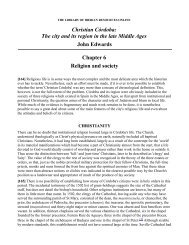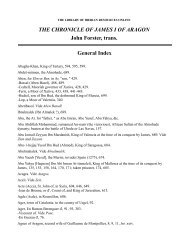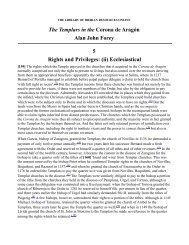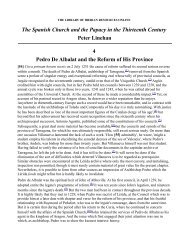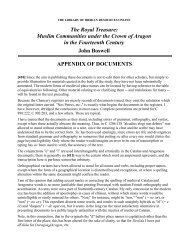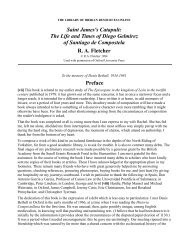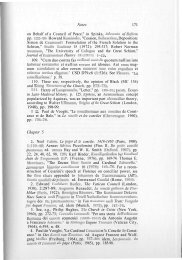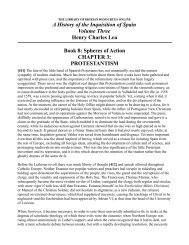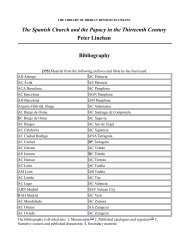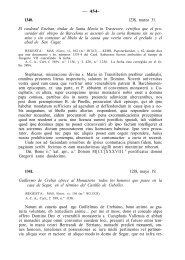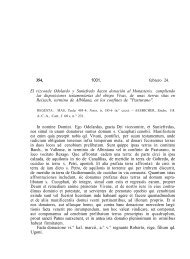Chapter 12 - The Library of Iberian Resources Online
Chapter 12 - The Library of Iberian Resources Online
Chapter 12 - The Library of Iberian Resources Online
You also want an ePaper? Increase the reach of your titles
YUMPU automatically turns print PDFs into web optimized ePapers that Google loves.
almahacen undivided water for<br />
common use<br />
Lorca - al-mahzan storehouse, deposit<br />
almatzem divisor Gandia partidor al-miqsâm divider<br />
azumbre water unit Novelda - thumn 1/8<br />
dula turn, water unit Gandia, Elche,<br />
Alicante<br />
tanda, hila daula, turn, rotation,<br />
alternation<br />
jarique sharer <strong>of</strong> water Lorca - sharîk partner<br />
jarro water measurement<br />
unit<br />
martava turn Alicante,<br />
Novelda<br />
Lorca - jarra cup, jar<br />
tanda, dula martaba rank; arrangement in<br />
regular sequence<br />
merancho drainage ditch Murcia azarbe marj meadow<br />
rafa canal check Murcia parada raf' raising up<br />
sistar divisor Vall de Segó partidor shatr, shitra<br />
(?)<br />
tahulla measure <strong>of</strong> land Murcia jovada,<br />
fanega<br />
water measurement<br />
unit<br />
Partition; division in 2<br />
equal parts<br />
tahwila field piece <strong>of</strong> land<br />
Lorca caballeria tahwila field piece <strong>of</strong> land<br />
If these generalizations are applied to words <strong>of</strong> presumed but unproven Arabic etymology, it is possible<br />
to make some guesses merely on the basis <strong>of</strong> whether the concept was developed outside [226] the<br />
Islamic framework. Thus tanda, in spite <strong>of</strong> phonetic difficulties in Corominas' derivation, is probably an<br />
arabism. (39) Tanda and tanta do not mean the same thing; tanzim comes much closer. (40) <strong>The</strong> fact that<br />
all <strong>of</strong> its synonyms (dula, ador, martava) are arabisms suggests that the concept <strong>of</strong> the turn was<br />
unknown or not highly developed among Christians. Likewise sistar from shatara, in spite <strong>of</strong> the<br />
infrequently found change from sh to s, is attractive because it means the same as partidor. Almatzem,<br />
the local variant for partidor in Gandia, provides a parallel case. (Vall de Segó and Gandia were among<br />
the relatively few irrigated areas in the medieval kingdom <strong>of</strong> Valencia where there were significant<br />
numbers <strong>of</strong> Muslim irrigators.)<br />
ARABIC THEMES IN ROMANCE VERNACULAR<br />
<strong>The</strong> expressions for the typical irrigation land-use patterns, huerta and vega, both seem to bear the<br />
Islamic imprint. It is probable that huerta is a translation <strong>of</strong> the Arabic, bustân, both words meaning<br />
"garden." (41) Vega is <strong>of</strong> uncertain origin, but Arnald Steiger believes it to be an arabism. (42)<br />
<strong>The</strong> irrigation system <strong>of</strong> Lorca preserves two interesting measures, casa de agua and tiempo de agua,<br />
both probably <strong>of</strong> Islamic ancestry. A royal privilege <strong>of</strong> September 23, <strong>12</strong>68, provides that the water <strong>of</strong><br />
Lorca is to be divided "communally, by days and by times" ("comunamente por dias y por tiempos").<br />
<strong>The</strong> concept <strong>of</strong> a "time" <strong>of</strong> water recalls the Arabic waqt, used in the same way (as a unit <strong>of</strong> water) in<br />
Iraq. (43) Also in Lorca, a casa (house) is said to be twelve hours <strong>of</strong> water, each day being divided into<br />
two "houses." If this expression is in fact medieval it seems quite clearly to be a translation <strong>of</strong> dâr,<br />
"house," which, in this case, is a dialectal pronunciation <strong>of</strong> daur, "turn." In the Saharan oasis <strong>of</strong> El



